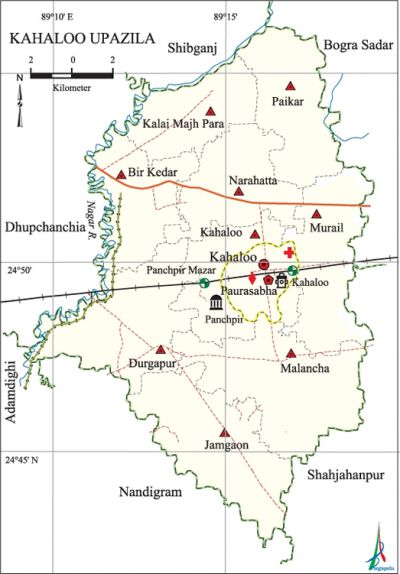Kahaloo Upazila
Kahaloo Upazila (Bogra district) area 240.42 sq km, located in between 24°43' and 24°57' north latitudes and in between 89°09' and 89°19' east longitudes. It is bounded by shibganj and bogra sadar upazilas on the north, nandigram and shahjahanpur on the south, Bogra Sadar and Shajahanpur upazilas on the east, adamdighi, dhupchanchia and Nandigram upazilas on the west.
Population Total 222376; male 110663, female 111713; Muslim 208315, Hindu 14031, Christian 6 and others 24.
Water bodies Main river: nagar.
Administration Kahaloo Thana was formed in 1928 and it was turned into an upazila in 1983.
| Upazila | ||||||||
| Municipality | Union | Mouza | Village | Population | Density (per sq km) | Literacy rate (%) | ||
| Urban | Rural | Urban | Rural | |||||
| 1 | 9 | 162 | 264 | 13887 | 208489 | 925 | 61.8 | 51.4 |
| Municipality | ||||||||
| Area (sq km) |
Ward | Mahalla | Population | Density (per sq km) |
Literacy rate (%) | |||
| 6.82 | 9 | 19 | 13887 | 2036 | 61.8 | |||
| Union | ||||
| Name of union and GO code | Area (acre) | Population | Literacy rate (%) | |
| Male | Female | |||
| Kalai Majh Para 47 | 4743 | 10429 | 10531 | 49.6 |
| Kahaloo 38 | 5194 | 8865 | 9202 | 57.1 |
| Jamgaon 28 | 8059 | 11966 | 11971 | 47.7 |
| Durgapur 19 | 7703 | 12402 | 12641 | 57.3 |
| Narahatta 76 | 5614 | 11278 | 11105 | 56.2 |
| Paikar 85 | 6011 | 11753 | 11670 | 43.9 |
| Bir Kedar 13 | 5289 | 11620 | 11954 | 50.7 |
| Malancha 57 | 8413 | 14147 | 14521 | 49.9 |
| Murail 66 | 6314 | 11248 | 11186 | 51.6 |
Source Bangladesh Population Census 2011, Bangladesh Bureau of Statistics.

Archaeological heritage and relics Mahadeva Jogi Rishi Mandir (Paikar union), Zamindar Kachari (Narahatta).
War of Liberation During the last part of October direct encounters were held between the freedom fighters and the Pak army in Karibamuja and Nashirpara areas of the upazila. During the war of liberation the Pak army conducted mass killing in different places of the upazila; they also set many houses of the upazila on fire. A memorial monument has been established at Kahaloo High School premises.
For details: see কাহালু উপজেলা, বাংলাদেশ মুক্তিযুদ্ধ জ্ঞানকোষ (Encyclopedia of Bangladesh War of Liberation), বাংলাদেশ এশিয়াটিক সোসাইটি, ঢাকা ২০২০, খণ্ড ২।
Religious institutions Mosque 360, temple 20, tomb 4. Noted religious institutions: tomb of Shah Baba Kalu, Dorga Hat tomb.
Literacy rate and educational institutions Average literacy 52.1%; male 54.9%, female 49.2%. Noted educational institutions: Kahaloo High School (1873),' Narahatta High School (1908).
Cultural organisations Library 1, club 72, cinema hall 2.
Amusement centers Jasmine park at Saraibazar of' Kahaloo Sadar.
Main sources of income Agriculture 67.34%, non-agricultural labourer 2.77%, industry 0.80%, commerce 11.25%, transport and communication 4.27%, service 4.31%, construction 1.01%, religious service 0.16%, rent and remittance 0.36% and others 7.73%.
Ownership of agricultural land Landowner 63.08%, landless 36.92%; agricultural landowner: urban 48.12% and rural 63.81%.
Main crops Paddy, jute, wheat, mustard, potato, vegetables.
Extinct or nearly extinct crops Aman paddy.
Main fruits Mango, blackberry, date, palm, banana.
Fisheries, dairies and poultries Hatchery 8.
Communication facilities Pucca road 148 km, semi-pucca road 9 km, mud road 385 km; railway 12 km; rail station 2.
Noted manufactories Rice mill.
Cottage industries Jute work, weaving, blacksmith, potteries, bamboo work, cane work, wood work.
Hats, bazars and fairs Hats and bazars are 20, fairs 9, most noted of which are Malkar, Kahaloo, Jamgaon, Durgapur, Valsun, Goabisha and Iroil hats; Dhakontala Khabashpur, Pathara and Bara Pukuria melas.
Main exports Fish and fish fry, paddy, rice, date molasses.
Access to electricity All the wards and unions of the upazila are under rural electrification net-work. However 63.1% of the dwelling households have access to electricity.
Sources of drinking water Tube-well 97.9%, tap 0.9% and others 1.2%.
Sanitation 68.0% of dwelling households of the upazila use sanitary latrines and 23.4% of dwelling households use non-sanitary latrines; 8.6% of households do not have latrine facilities.
Health centres Upazila health centre 1, satellite health centre 4, maternity and child centre 4, diagnostic centre 1, family welfare centre 8, veterinary hospital 3.
Natural disasters The flood of 1954 caused heavy damages to settlements and crops. Besides, the flood of 1988 caused loss of life and damages to crops of the upazila.
NGO activities Operationally important NGOs are asa, brac, thengamara mahila sabuj sangha, ECD. [Md Khairul Alam Pulak]
References Bangladesh Population Census 2001 and 2011, Bangladesh Bureau of Statistics; Cultural survey report of Kahaloo Upazila 2007.
